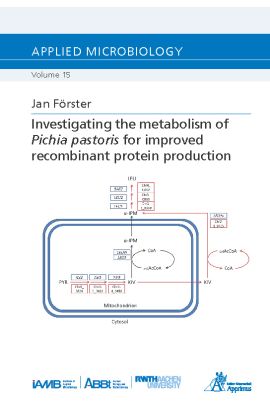With the ever-increasing demand for proteins, the production host, including its metabolism, moves into focus. Applications as different as additives in washing detergents and biopharmaceuticals demand on the one hand low production prices, and on the other hand high reproducibility and comparability of post-translational modifications, respectively. One well established production host is Pichia pastoris, increasingly used in industry for recombinant protein production. In this thesis, contributions for increasing the knowledge space of P. pastoris, as well as tools for the protein production pipeline were in focus.
As stated, for optimization, one requires knowledge, here, detailed knowledge on the amino acid biosynthesis network. Specifically, the amino acid leucine was chosen as prime example, as it is a multi-enzyme compartmented pathway, also encoded by duplicate genes in baker´s yeast. A combination of bioinformatics analysis and protein localization studies highlighted that baker´s yeast can’t be used as a general blueprint for every yeast amino acid pathway. Finally, the structure of the leucine biosynthesis pathway in P. pastoris could be determined.
With this information in hand, the idea of amino acid availability increase by deregulation of synthesis pathways was exemplified using leucine. Feedback inhibition, prominent in many amino acid pathways, was deleted through mutagenesis of the alpha-isopropylmalate synthase gene (LEU4) by the non-metabolizable leucine analogon trifluoroleucine. Stable isotope experiments with 13C-labelled glucose enabled the measurement of de novo synthesized amino acids. Indeed, the mutagenized leucine pathway resulted in increased leucine biosynthesis. This approach enables the construction of strains that are tailored towards the overproduction of defined amino acids.
For many applications glycosylation is key. However, the metabolic impact on glycosylation is rarely quantified. Here, special attention was given to the glycosylation chain length in regard to the glycosylation site number. The results indicate a limitation in cytosolic GDP-mannose availability and glycosyl transferase capacity during recombinant protein production.
The results of the thesis indicate that metabolism not only impacts the rate of protein synthesis, but also the quality of the protein of choice. Here, both aspects were investigated in detail, contributing to the ever increasing knowledge base of P. pastoris.
| Autor | Förster, Jan |
|---|---|
| Lieferzeit | 3-4 Tage |
| Gewicht | 0.29 kg |
| Erscheinungsdatum | 15.11.2019 |
Institut für Angewandte Mikrobiologie (iAMB)
Investigating the metabolism of Pichia pastoris for improved recombinant protein production
Kurzbeschreibung
In research and industry, many different organisms are established as hosts for production purposes. For recombinant protein production, a wide range of microbial hosts is industrially established. While many optimized strains (chassis) exist that elevate protein production metabolically optimized chassis are rare. To contribute to this gap, in this thesis, the chassis idea is extended to metabolism. The industrially relevant yeast Pichia pastoris was used as model chassis throughout the thesis.

